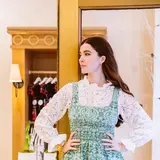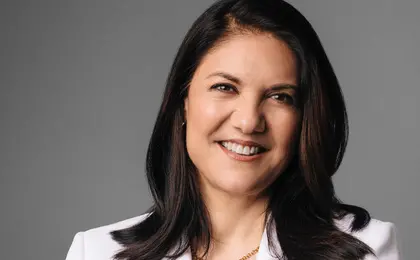
Nell Diamond ’15
MBA
Founder and Chief Executive Officer, Hill House Home
By Rebecca Beyer
Nell Diamond’s interest in fashion started early. When she was a child, she discovered that she could try on the outfits that came with her oversized Barbie doll; growing up in London, where she spent part of her childhood, she relished trips to the Portobello and Camden markets to explore booth after booth of vintage and boutique clothing.
“It just brought me so much joy,” she remembers, adding that her parents encouraged her interest in style as “a creative outlet and form of self-expression.”
But it took years and a brief foray into finance for Diamond to see her passion for fashion as a potential career.
“I had internalized this message that anything archetypically feminine should be a hobby and not a career,” she explains. “Later I realized how absolutely false that idea is, how rooted it is in misogyny.”
Today, Diamond is the founder and chief executive officer of Hill House Home, a wildly successful lifestyle company that she created while she was a student at Yale SOM. Hill House Home began selling bedding and sleepwear from its direct-to-consumer website in 2016. The company has continued to “drop” new products, including the iconic Nap Dress, named for Diamond’s penchant for dresses comfortable enough to nap in but nice enough to wear to dinner. (“It’s not a nightgown,” Diamond stresses.)
This past year, Hill House Home (the company’s moniker is a nod to—among other things—New Haven’s historic Hillhouse Avenue) closed a $20 million Series B funding round; in January, it opened its third permanent brick-and-mortar store in Palm Beach, Florida, and more expansion is on the way.
Building the brand has been “truly one of the most humbling experiences of my life,” Diamond says. “This was an idea in my brain sitting at a desk on literal Wall Street. There’s so much doubt that comes with that.”
Diamond grew up in Tokyo and London; her family moved often because of her father’s career in finance. When it was time for college, Diamond chose Princeton, where she “adored” the English department and wrote her thesis on the portrayal of women’s femininity—and in particular women’s hair—as a dangerous and even deadly thing in literature and art ranging from Greek mythology and the Bible to Disney films.
“What all that represents is a fear of unbridled femininity,” she explains. “Everything I do now challenges the conception of what a woman should be.”
After Princeton, Diamond worked for two years at Deutsche Bank in New York. She liked her boss and performed well, but conforming to the financial world’s norms for how women should appear—straight hair, dark suits, minimal makeup—made her feel “very intensely that I was wearing a costume,” she says. “It just didn’t feel like me.”
She was interested in what she calls “great consumer brands,” especially newer ones such as Warby Parker, and began to imagine what it would take to create her own company. She quickly focused on fashion and lifestyle.
“Maybe because I moved so much, I’m very particular about the environment I live in,” she explains. “I wanted to help people create a life that felt good to them, to figure out their style and make it happen in a way that felt practical and cost effective.”
Her first step? Business school. She applied only to SOM.
“There were so many people with such a diverse range of interests,” she says of the school. “I didn’t want to go to a business school that was all one thing.”
In her first year, Diamond loved a core class called Innovator, which tackles idea generation, evaluation, and development. She also enjoyed a leadership course she took with Professor Jeffrey A. Sonnenfeld, who engaged with students on a range of topics, including diversity and inclusion in the workplace. Diamond has returned to Sonnenfeld’s class in recent years as a guest speaker.
“He is one of my all-time favorite professors,” she says.
After an internship at Louis Vuitton in New York, Diamond spent her second year at SOM developing her idea with help from the then-newly launched Program on Entrepreneurship, run by Kyle Jensen and Jennifer McFadden. In the program’s incubator, she came up with—and trademarked—the Hill House Home name and began the process of creating the business from the ground up. Katherine Kapnick ’19 was a founding team member; she remains an investor and friend.
“Starting organically was definitely rooted in my experience at SOM,” Diamond says. “I knew I wanted to find my ‘product market fit’ without artificially inflating the business the way many direct-to-consumer companies do with venture funding.”
In the Innovator class at SOM, Diamond had studied the idea of a company’s minimum viable product. For Hill House Home, that was a website, which was the only way to buy the company’s products until Diamond started a pop-up store on Nantucket last summer (now a permanent location).
“We wanted to get our name and voice out there without spending so much money and time that we couldn’t change things,” she explains.
In fact, change is built into the Hill House Home product development process. For instance, the original Nap Dress did not have pockets, which distorted the dress’ shape in the design process.
“Then we started hearing from people about how much they needed pockets,” Diamond recalls. “So, we figured out a way to make them work.”
(Diamond trademarked the Nap Dress name, too, because she learned at SOM that doing so was good practice. “I had no idea how big it was going to be,” she laughs.)
Everything about Hill House Home, she adds, has been “about iteration.”
“We do not create products in a vacuum with internal people sitting around a conference table with a whiteboard,” she says. “So much of it is about customer feedback.”
Diamond has taken steps to prioritize diversity, equity, and inclusion at her company, internally and externally. Hill House Home vets its suppliers to make sure its production process is safe, offers “all-gender” and inclusive sizes, and works with trans influencers in its social media campaigns.
“I think I have a responsibility as a cis, White female founder with a ton of privilege to really be sure that we don’t just talk about our values but that we actually enact them,” she says.
Over the company’s seven years, Diamond says she is most proud of the team she has assembled and how well they work together.
“What goes into making a product that ends up on someone’s body—the number of hands that touch that product—it’s one of the coolest things I’ve been exposed to,” she adds.
And she continues to draw on the lessons she learned at SOM, where she is a member of the Entrepreneurship Advisory Board.
“The instinct I had to go to SOM because of the very, very diverse range of interests was the right instinct,” she says. “It can be so easy in business to think you are the center of the universe. SOM does such a good job of providing perspective to students about how much impact they can have but also how small they are in the great, grand scheme of things. That humility is really important.”
Photo courtesy of Hill House Home
Interviewed on January 23, 2023
Related Profiles

Shreya Arora ’25

Mary Ellen Iskenderian ’86

